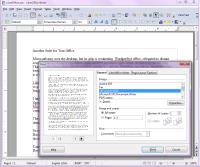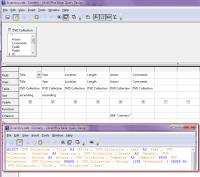Another Suite for Your Office
Microsoft may own the desktop, but its grip is weakening. Wordperfect office, relegated to distant second place as Windows machines replaced DOS machines, now seems at best to be an also-ran. That's sad for those of us who loved DOS version 5.1, but the world has moved on. OpenOffice has been in contention for several years, but has largely failed to catch on. Now there's LibreOffice. Maybe it will have a better chance.
LibreOffice is what's called a fork application. So called because developers of an application choose to go in different directions. The code base splits, just as a road might split, and the new versions no longer share a complete code base.
Late in 2010, some members of the OpenOffice Project created The Document Foundation. At the time, OpenOffice was testing beta version 3.3 and there was a concern that Oracle, which acquired Sun Microsystems, would shut down OpenOffice as it did with OpenSolaris. Oracle doesn't like competitors with free products that compete with its expensive products.
The developers invited Oracle to join The Document Foundation. Oracle not only refused, but also demanded that all members of the OpenOffice board resign.
So now LibreOffice exists as a product you can't buy but you can download and use for free. The Document Foundation's goal is a lofty one: To create a vendor-agnostic office suite with open-document format (ODF) support and without any copyright assignment requirements.
Canonical (Ubuntu), Novell, and Red Hat will include LibreOffice in their operating systems. Development continued though most of January and the first stable version was released on January 25.
 Current versions of these free applications can open many Microsoft documents, but may not always be able to save files in a Microsoft format. LibreOffice Base, the database application, can open current and older Access database files, but then must save the file in open database (odb) format. In Writer, some of the dialog boxes have been greatly improved as has document navigation. LibreOffice Calc works better now with Excel files and can import spreadsheets with up to 1 million rows.
Current versions of these free applications can open many Microsoft documents, but may not always be able to save files in a Microsoft format. LibreOffice Base, the database application, can open current and older Access database files, but then must save the file in open database (odb) format. In Writer, some of the dialog boxes have been greatly improved as has document navigation. LibreOffice Calc works better now with Excel files and can import spreadsheets with up to 1 million rows.
 LibreOffice Math is a freestanding equation editor. The user writes a description of the formula and the equation editor displays it. The resulting equation can be saved and, presumably, inserted into a document.
LibreOffice Math is a freestanding equation editor. The user writes a description of the formula and the equation editor displays it. The resulting equation can be saved and, presumably, inserted into a document.
 I couldn't find a way to do that, but Math can be opened from inside writer and the resulting equation is placed in the document.
I couldn't find a way to do that, but Math can be opened from inside writer and the resulting equation is placed in the document.
LibreOffice requires the Java Runtime Environment (JRE) to run. This is not mentioned during the installation and the installer doesn't include it. JRE is easy enough to obtain and may already be installed on your system but it should have been mentioned. The installation is also hampered by forcing the user to download and install two components, although this is not clearly explained on the website. You need the LibreOffice installer and what's referred to as a "help pack". These are the help files in US English and if you don't install this component, the Help menu looks to the LibreOffice website for help instead of to files on your computer.
Users may include scalable vector graphic images in Writer documents and these may be edited with the LibreOffice Draw component.
Somewhat inexplicable is a decision by the developers to add support for Lotus Word Pro files and to improve support for WordPerfect files. Even stranger is the ability to open Microsoft Works documents. And for those who can't quite figure out how to create a title page, Writer has a function to help.
 Besides the ability, in Calc, to open larger spreadsheets, many Excel keyboard shortcuts now work in the application. Calc also offers 3 ways of displaying cell location: Calc A1 and Excel A1 seem to be identical in that they list the column first (A, B, C, …) and then the row (1, 2, 3, …). The other option is Excel R1C1 format, which lists the row first, preceded by "R", and then the column, preceded by "C". Unless you manually type formulas, it probably doesn't matter which you use. The default is the shorter A1 format.
Besides the ability, in Calc, to open larger spreadsheets, many Excel keyboard shortcuts now work in the application. Calc also offers 3 ways of displaying cell location: Calc A1 and Excel A1 seem to be identical in that they list the column first (A, B, C, …) and then the row (1, 2, 3, …). The other option is Excel R1C1 format, which lists the row first, preceded by "R", and then the column, preceded by "C". Unless you manually type formulas, it probably doesn't matter which you use. The default is the shorter A1 format.
Although Calc can honor Excel's conditional formatting, it has the same limitations that Excel had prior to the 2010 version in that it recognizes only 3 conditional statements.
Impress continues not to be particularly impressive, but it does cover the basics and a new Presenter Console adds the ability for the presenter to see one view on a notebook computer while people watching the presentation via a projector can see something else. This is a feature that PowerPoint had starting with the 2003 version.
 LibreOffice Base, as I noted earlier, can open an Access database, but then must save the document in open database format before it can be used. Additionally, the open dialog includes several questions that will puzzle most users: Do you want base to "register" the database and following the import, do you want to open the database or the table designer. The defaults are register and open the database, which are correct for most uses.
LibreOffice Base, as I noted earlier, can open an Access database, but then must save the document in open database format before it can be used. Additionally, the open dialog includes several questions that will puzzle most users: Do you want base to "register" the database and following the import, do you want to open the database or the table designer. The defaults are register and open the database, which are correct for most uses.
Unfortunately, there's no analog to Microsoft OneNote in LibreOffice and OneNote is one of the best and most useful additions to Office even though (for reasons that are opaque) Microsoft elected not to include OneNote in most versions of the Office suite.
 LibreOffice Draw is a limited vector drawing application. In 1993, it would have been quite impressive. Today, not so much.
LibreOffice Draw is a limited vector drawing application. In 1993, it would have been quite impressive. Today, not so much.
LibreOffice 3.3 is available for Windows (32-bit only), Apple's OS X (PPC and Intel processors), and Linux (32-bit and 64-bit, RPM or Debian packages.)
 Bottom Line: Inexpensive office suite may be adequate
Bottom Line: Inexpensive office suite may be adequate
Sometimes "good enough" is good enough. LibreOffice isn't outstanding on any count, but the cost (free) is welcome and if you need little more than basic functionality, you could save some money this way.
For more information, visit the LibreOffice website.
Homeland Security Grabs Domain Names
You may have been under the impression that the Department of Homeland Security was mainly the "take your shoes off agency" (TSA) or one of the other agencies designated to protect the nation from terrorism or help with recovery following a natural disaster. But it seems that the Department of Homeland Security is seriously concerned about streaming video. Really. And this week the agency seized a bunch of domain names to keep them from illegally streaming the Fox network's Super Bowl.
Have these guys ever heard of due process?
"These guys", by the way are ICE—Immigration and Customs Enforcement. I'm still trying to find the connection between immigration and streaming video, but I'm sure somebody at ICE sees some connection.
Some of the nabbed domains are channelsurfing.net, hq-streams.com and .net, atdhe.net, rojadirecta.com and .org, firstrow.net, and several spellings of ilemi.com. Several of the domains are already back, but with different names. Many of the sites are physically located outside the United States, so maybe electrons on a wire are considered to be tiny illegal immigrants.
I keep thinking that ICE and the entire DHS should have more important things to do. Things like converting the theater of airline security into actual airline security. Or finding a way to examine more than just a tiny number of cargo containers that arrive daily. Or if they want to secure the Internet, maybe they could find a way to stop spam.
Late last year, ICE seized 80 other domains that agents said were being used to sell counterfeit goods. That seizure was conducted on Cyber Monday, the day that people supposedly go wild and place online orders for holiday gifts. But then Homeland Security always has had a good sense of theatrics even if there's not much substance behind it.
What's particularly troubling is DHS's policy of taking action against sites they consider to be illegal, seemingly without due process. Site owners are not contacted in advance and are given no opportunity to defend themselves. A simple warrant from a district court judge allows ICE to take over control of domain names.
Does this sound at all like censorship?

A Better Idea for Homeland Security
Software security company PC Tools reminds us that big events such as the Super Bowl often attract online criminals. And online criminals attract PR folks from software security companies. Maybe instead of trying to stop a little online video filching, DHS could concentrate on the real criminals.
"If an online program costs $49 to view and 1,000,000 people view it for free, that costs tax dollars and jobs." That sounds reasonable, but it really doesn't pan out. Tax dollars, yes. Jobs, no. If 5,000,000 people watch instead of 1,000,000, no jobs will be saved or created. The company presenting the program will make more money and the government will see more tax revenue. But that's where the buck stops.
And really if 1,000,000 people watch for free and the free option goes away, most of them won't pay $49 to watch it. They'll just skip it. But I digress.
The folks at PC Tools says that we should expect "record-breaking numbers of online threats and cyber attacks related to Super Sunday as compared to other holidays or events."
It's true that lots of advertisers relate their ads to websites and that a lot of people do log on during or after the game. And prior to the game, a lot of people use their computers to research the players.
Because of this, says PC Tools, "cybercriminals target Super Sunday as more football fan-related ads, commercials, and betting sites explode on the Internet." And you know how messy it is when things explode on the Internet. All of the electrons must be taken out of service and painstakingly cleaned by hand.
PC Tools notes that an account in Ad Age predicts that advertisers will use social media at record levels during the game. We'll also see "increased numbers of fake ads targeting young males". Click the provided link and you may end up on a malicious website.
To protect users' privacy and safeguard their personal information, browser companies are developing new technologies to restrict the transmission of personal data and PC Tools recommends running up-to-date anti-virus and security software for greater protection. (You knew they had to get to the sales pitch sooner or later, right?)
They're right, of course. You do need to have good security applications installed on your computer and it's important to be aware of your surroundings, just as you would be in an unfamiliar area of a large city.
But I keep thinking that the Department of Homeland Security would be more effective if it decided to go after some of the real cyber criminals.
Short Circuits
Want a Verizon Iphone? You're Too Late. (This Week)
If you want an Iphone, you have a choice now. AT&T finally has some competition. Verizon started selling pre-order phones this week and all available pre-sale models sold out within a day. According to Verizon, demand was greater than for any previous release, beating both the Motorola Droid and Droid X.
In fact, that happened in the first 2 hours. That brief period beat Verizon's previous best-ever launch. Pre-sales were for people who qualified for the program. Next week, anybody who wants a phone can buy one.
But should you? You'll have to pay to break your AT&T contract. In addition, the Verizon model is a third generation phone instead of the faster fourth generation used by AT&T. Verizon is upgrading its network, but you'll have to buy a new phone when that happens.
Both Apple's and Verizon's websites will resume selling the phones at 3 in the morning next Wednesday. You'll also be able to find them in Apple and Verizon Stores, at Best Buy, and in some Wal-Mart stores.
Complaints about dropped calls on AT&T's network have been widespread and those who have tested the Verizon version of the Iphone say this is not a problem on that network. That may change when millions of new users start flooding Verizon's network with data and voice.
AOL Continues to Shrink
AOL's quarterly advertising income dropped by a quarter in the most recent quarter. Actually, 26%. Even so, AOL's CEO, Tim Armstrong, says he expects to see some growth this year in advertising.
AOL's stock prices dropped 5% on Wednesday. Armstrong says it's time to stop working on the turnaround and start working on the comeback. This is supposed to lead to growth in the second half of 2011.
By lowering expenses, AOL was able to report fourth-quarter earnings of $66.2 million, or 61 cents a share. That's a considerable improvement from a year ago when AOL earned $1.4 million.
AOL acquired Time Warner at the height of the Internet bubble, but Time Warner recovered and spun off AOL. In the past year, AOL has made a number of acquisitions, including technology blog TechCrunch for about $30 million. In addition, AOL has set aside $50 million to expand Patch to a total of 500 local community sites by the end of this year.
Egyptian Government Sites Hit by Hackers
Trouble isn't just in the streets in Egypt. Those supporting anti-government protests shut down government websites this week. A worldwide anonymous group that goes by the name "Anonymous" shut down sites belonging to the Ministry of Information and President Hosni Mubarak's National Democratic Party.
The group is believed to have about 500 members. Last month the same group claimed responsibility for shutting down websites that belong to the government of Tunisia. And it also attacked sites owned by MasterCard, Visa, and PayPal after those companies refused to process donations to WikiLeaks.
The Egyptian government shut down the Internet when street demonstrations began and Anonymous tried to turn the tables on the Mubarak administration.
Members of Anonymous have been arrested and their equipment has been confiscated in Britain, Netherlands, Sweden, Germany, and France. The FBI has also obtained several dozen search warrants. If found and convicted, those who launch distributed denial of service attacks could spend 10 years in prison.



 The author's image: It's that photo over at the right. This explains why TechByter Worldwide was never on television, doesn't it?
The author's image: It's that photo over at the right. This explains why TechByter Worldwide was never on television, doesn't it?
